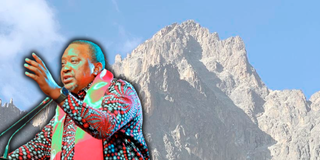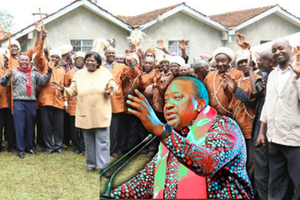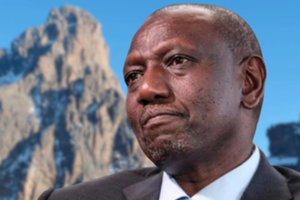
After his tense relationship with President William Ruto, Kenyatta is now re-engaging with the region, with several of his allies appointed to key Cabinet positions by Ruto.
As the country debates former President Uhuru Kenyatta's recent move to close ranks with President William Ruto to win the political soul of Mt Kenya, the development has thrown a spotlight on how his political career has had mixed fortunes in his backyard.
Mr Kenyatta's allies have since been appointed to the Cabinet, a week after President Ruto visited him at his Ichaweri village in Gatundu South constituency, Kiambu County, to mend fences after more than two years of acrimony.
In the new-look Cabinet, President Ruto appointed former Kiambu Governor William Kabogo as Cabinet Secretary for Information, Communication and Digital Economy and Mr Mutahi Kagwe for Agriculture.
Former Nakuru Governor Lee Kinyanjui has been appointed Cabinet Secretary for Investment, Trade and Industry, while former Murang'a Senator Kembi Gitura has been appointed Chairman of the Board of Kenyatta University Referral Hospital.
Former Laikipia governor Ndiritu Muriithi will be chairman of the board of the Kenya Revenue Authority.
Mr Kenyatta's love-hate relationship with the Mountain saw his constituents in Gatundu village reject him in 1997 when he sought to become their MP.
Mountain voters united with the rest of the country to reject his first presidential bid in 2002 when he was defeated by Mwai Kibaki.
Mr Kenyatta reciprocated that rejection in 2005 when he joined the Orange Democratic Movement to defeat the banana wing led by President Kibaki that was pushing for a yes vote on the draft constitution.
Not only did Mr Kenyatta emerge victorious alongside the Orange side led by Mr Raila Odinga, but for good measure he joined in the victory declaration that declared "tumeshinda katiba ya adui (we have triumphed over the enemies of the constitution)".
The implication of this statement, made outside the Kenyatta International Conference Centre (KICC), was that only Mt Kenya, led by Kibaki as the kingpin, appeared to be the only region in favour of this draft constitution.
It goes without saying who exactly the Odinga/Kenyatta brigade saw as the enemy.
Emotions between Mr Kenyatta and the Mountain were so frosty that protests against him were staged in Gatundu town, funded by some of his family members.
But in 2007, Mr Kenyatta surprised everyone when, as the official leader of the opposition, he withdrew from the presidential race and threw his lot in with the incumbent, Mr Kibaki.
A mountain that usually runs its political race mired in raw emotions of either love or hate immediately and completely forgot that Mr Kenyatta was a 'villain' and started praising him, declaring that he was a president in waiting.
Mr Kibaki went on to win that 2007 election, but Mr Odinga, who had been declared runner-up, challenged the results, Mr Kibaki was sworn in hastily and in near darkness... and the country erupted in post-election violence.
Mr Odinga had lost the election in which Mr Kibaki won 4.6 million votes (46.42 per cent) to Mr Oginga's 4.4 million (44.07 per cent).
The violence that followed the disputed presidential election of December 27, 2007, in which at least 1,500 people were killed, thousands maimed and some 600,000 displaced until a peace deal was sealed on February 28, 2007, opened a new political chapter.
Mr Kenyatta was named by the International Criminal Court (ICC) as one of six suspects responsible for the violence.
The others were then Public Service chief Francis Muthaura, then police chief Hussein Ali, opposition politicians William Ruto and Henry Kosgey, and journalist Joshua Sang.
The ICC case made Mr Kenyatta a hero among residents of Mount Kenya, who argued that he had paid the price for defending the community.
Mr Kenyatta later teamed up with Dr Ruto to win the 2013 presidential election.
President Kenyatta was re-elected in 2017.
But in 2018, Mr Kenyatta called a truce with his arch-rival, Mr Odinga, a deal that was not well received in the region.
In the run-up to the 2022 elections, Mr Kenyatta had even publicly stated that "this country cannot be led by the Agikuyu community alone, others are qualified".
This statement so angered his people in the hills that they backed Dr Ruto instead, despite opposition from outgoing President Kenyatta.
His preferred successor, Mr Odinga, lost the 2022 presidential election to Dr Ruto, who received overwhelming support from Mt Kenya.
Mr Kenyatta retreated into retirement to deal with tongue-lashing, ridicule and hostility that included his own mother being defamed in public rallies, his Northlands Estate raided and sheep stolen while he was told he did not matter.
Meanwhile, Dr Ruto, for whom the Mountain people had wholeheartedly voted, had begun to show signs of acting against expectations, notably in his love of draconian taxes, a perceived culture of lies, dividing and ruling the Mountain and eventually sharing power with Mr Odinga before impeaching his deputy, Mr Rigathi Gachagua.
The region immediately went into a full-blown rebellion, showing open bias against Dr Ruto and his loyalists, and Mr Gachagua became the region's king of rebellion.
"Then the very Kenyatta who had told us that Dr Ruto was not worthy of being President, a fact that we discovered late to be so credible that we apologised to him for not heeding his calls, emerged from Ichaweri shaking hands with the same President Ruto," says Embakasi North MP James Gakuya.
Mr Gakuya says, "This is an act of hypocrisy", while Gatanga MP Edward Muriu adds that "Kenyatta who wronged us in 2022 (by saying Agikuyu were not the only qualified presidential candidates) meeting President Ruto who wronged us in 2024 (by impeaching Gachagua) makes this a zero-sum game".
Although Mr Kenyatta is yet to announce whether he intends to support President Ruto in his bid for a second term in 2027, his relationship with his people in Mt Kenya has returned to one of guarded suspicion.
Mr Kenyatta a man who was born the son of the nation's founding father, Mzee Jomo Kenyatta, pundits now say his rise to become the country's fourth president - like his father - was something of an accident.
"It is not exactly that it was an accident, no, because those of us who were his father's confidants saw a man who would become great. His father had invested too much leadership advice in him. Only that Kenyatta senior grew up as a carefree man who escaped the trappings of greatness," says longtime provincial administrator Joseph Kaguthi.
Mr Kaguthi, who confesses that as a junior district officer in the early 1970s he would occasionally visit the Kenyatta family in their Gatundu village, says: "Kenyatta junior was an amazing boy who grew up rebelling to be with the humble people outside the greatness of his royal family."
Mr Kaguthi says that when a good biography of Kenyatta junior is published, "perhaps it will detail for good measure how his mother Mama Ngina made it her project to beat her son back to the leadership railings".
Mr Kaguthi reveals that "Kenyatta junior showed every sign of investing his life in independence, of becoming a commoner uninterested in the trappings of power and wealth in which his family swam".
The administrator says: "Mama Ngina and well-wishers who knew there was a seed of leadership in Uhuru Kenyatta made it a Rapid Results Initiative (RRI) to mould him into what he was meant to be, away from his love of fun and adventure in the streets and villages away from the first family home."
Mr Kenyatta's cousin, Mr Kung'u Muigai, says that when the former president turned 30 in 1992, many in the family knew he was a natural leader as effective as his late father, who died in 1978.
"Unfortunately, Uhuru did not seem to recognise leadership in himself, which is why he insisted on being a French beans broker on the common border between Kiambu and Murang'a, near the Blue Post Hotel," he says.
In 1997, Moi influenced his elevation as Gatundu chairman of the then-ruling party (Kanu), which his father had once led, and made him a parliamentary candidate in his home constituency of Gatundu South.
His main rival was Moses Mwihia of the Liberal Democratic Party (LDP).
Mr Kenyatta lost the count after Mwihia kidnapped himself, and staged a fake murder on his person - the greenhorn that was Kenyatta junior took all the blame - and when the results came in, Mwihia had won by more than 12,000 votes.
Mr Kenyatta is said to have been so distraught by the experience of that race that he vowed never to get involved again - and retreated to the social life he loved - partying and occasionally overseeing some of his vast family businesses.
In 2001, Moi went for the jugular in Kenyatta's political rebellion and nominated him to parliament - after persuading Mark Too to resign to make way for him.
In quick succession, Moi appointed Kenyatta to the cabinet, where he was given the local government ministry a month later, before nominating him as a presidential candidate in 2002, which he failed to do.
It was not until 2013 that Kenyatta Junior became president, ruling for 10 years and now in retirement, still making waves on the political scene.
The political scientist and economist from Amherst College in Massachusetts has been in politics for 27 years.










